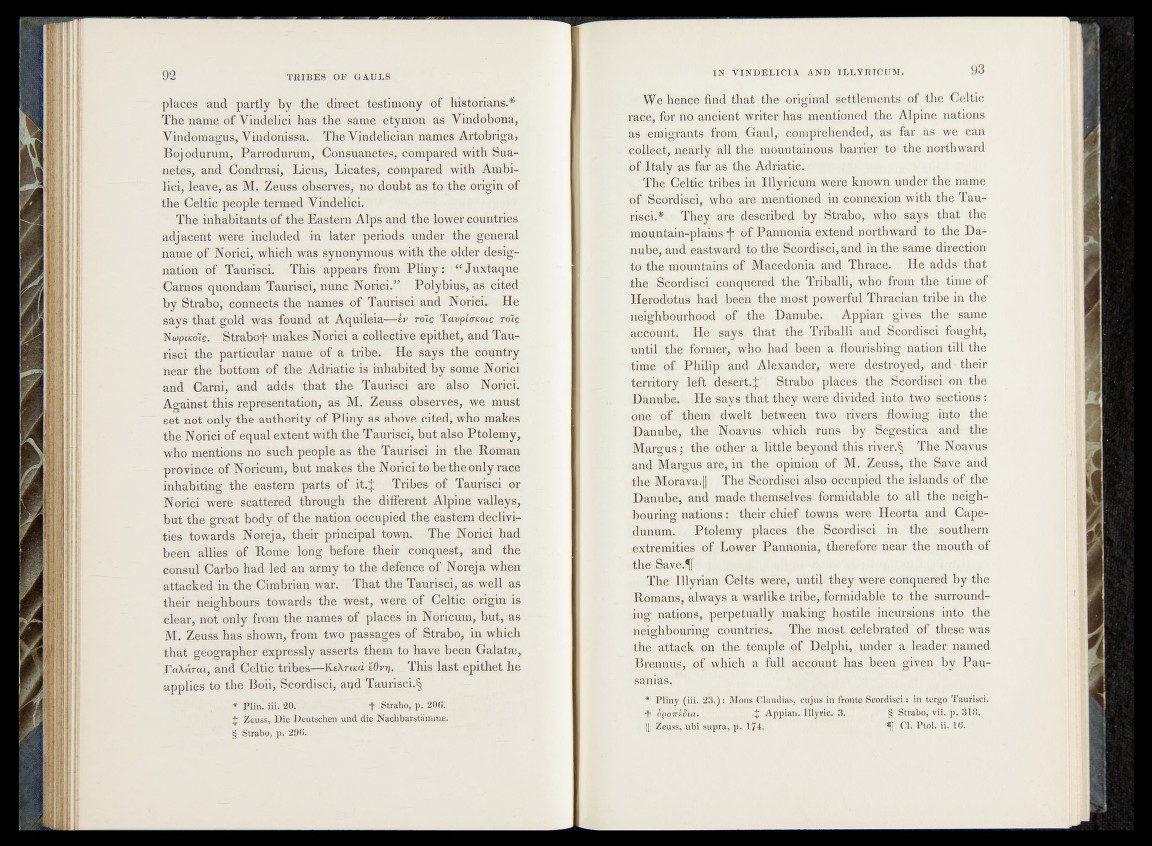
places and partly by -the direct ‘testimony of historians.^
The name.of Vindelici has the rsame-etymon as Vindobona,
Vindomagus, Vindonissa. The Vindelician names Artobriga>
Boj odurum, Parrodurum, Consuanetes, eompated with Sua-
netes, and Condrusi, Licus, Licates, compared with Arnbi-
lici, leave, as M. Zeuss observes, no doubt as to the origin of
the Celtic people termed Vindelici.
The inhabitants of the Eastern Alps and the lower countries
adjacent werein eluded in later periods under the general
name of Norici, which was synonymous with the older >d®§?gf
nation of Taurisci. This appears from Pliny: «Juxtaquë
Carnos quondam Taurisci, nunc Norici.” Polybius, as cited
by Strabo, connects the names of Taurisci and Norici.- He
says that gold was found at Aquileia—iv role Tavpivicoie rots
NwptKoïc. . JStrabo^makes Norici a collective epithet, and Taurisci
the particular name of a tribe. He says .the country
near the bottom of the Adriatic is inhabited by some. Nqrici
and Carni, and adds that the Taurisci are also Norici.
Against this representation, as M. Zeuss observes, we-must
set not only the authority of Pliny as above cited, who makes
the Norici of equal extent with the Taurisci* but also Ptolemy,
who mentions no such people as the Taurisci in the Roman
province of Noricum, but makes the Norici törfee the only race
inhabiting the eastern parts of it.| Tribes of Taurisci or
Norici were scattered through the different Alpine valleys,
but the ’great body of the nation occupied the eastern declivities
towards Noreja, their principal town. Thé Norici had
been allies of Rome long before their conquest, and the
consul Carbo had led an army to the defence of Noreja when
attacked in the Cimbrian war. That the Taurisci, as well as
their neighbours towards the west, were of Celtic origin is
Clear, not only from the names of places in Noricum, but, as
M. Zeuss has shown, from two passages of Strabo/ in which
that geographer expressly asserts them to have been Galatm,
TaXatdi, and Celtic tribes—KeXrucd tdvn^- This last epithet he
applies to the Boii, Scordisci, and Taurisci.§
* Plin. iii. 20. + Strabo, p. 206.
+ Zeuss, Die Deutgchen und die Nachbarstamme.
§ Strabo, p. 296. -
We hetiee- fib'cl that the original settlements of the Celtic
race, for no ancient writer*has m|n^oa|ed;the Alpine nations
as emig^htsj from, ^Ga-ul,^comprehended, as. far as we can
coPeo%nea-ripi.all the mounta%«ji’l: barrier.* to* the northward
of Italy-$p|i;far.“as the Adriatic. - ■
The.Celtic trijjj^l^n Ifj^rimim*weri^known under the name
ofvi§^ordis;@j,>*‘ whql <Jpe menri®^edy|feij^prine,xion, with the Tau-
Theyrarr^despribed fe . Strabo;, who says*,-that the
mouritainiplains^^|fephnn'dnia'<eriten|i northward to the Da#
nubo# and* eastwaird^fto th^|§^|»,fdikei^and.m thersamc direction
■^the x rp u n t^ s of Macedonia;! and Thrhce.„, Be-' a d d ^ ^ t
the.o^pr,disci conquered .the Triballi, who from the gimo-bf
Herodotjife had be#£*^he^most powerful Thfaei^n-tribe in the
■neighbourhood upfl the Danube.. A,pp[i^n|-'^a^s the same
i^cgpunt. 1 ^ . sa^fethat th^|Bribo.lli and^©pidisci -fought,
u^ari4®B^^mor, who had; befeniJa flourish inga-nation tilhthe
diimelfc?Philip' and Alexander, wemudffstji©yfed,; and * their
territory-deft dtesert.^ Strabo places-f the /Scordlisei“ on .the
Danube-. • ■ He says thatUhqy w^e^ft^-^^info two sections:
them' dwelt ^between1 two> river®; flowings into? t|jsp
Danube, the Noav.Us' jvyhich r un^iHf ’’/S^b^rica and*ns|^ e
Margusj; ,the other.a little beyond this riv-er.^SThe Nbavus
and Mar-gus alrfe, in the.opinion of M. Zeuss,.the Save jan’d-
itik,eisMor.ava';|| The^Scordi^ci alsfcb.oc6n.pied the^iplands of.the
Danube* and maderthenss^|vs®sl formidable ito lalLrthe-jie'igh-
bouring nations*: their chiefs towns were Heorta and-Cape-
dunum. Ptolemy places the Scordisci in the .southern
extremities of Lower Pannonia, therefore, near the mouth of
the. Save.^f'
The Illyrian Celts were, until they were conquered by the
Romans, always- a warlike .tribe; formidable to .the surrounding
nations, perpetually making; hostile * incursions into the
neighbouring countries». ^ The mosjt^celebrated of these was
the attack on the temple of Delphi, under a^eader named
Brenmus, of which a full, account has »teen ^feep , by Pau-
sanias. ”
* Pliny1 (iii. 23.) s Mons Claudias,. cpjbs in fronte Scordisci: in tergo Taurisci.
’+ tfpO T rM \k .'} / t Appiap. Illyric. 3. § Strabo, vii. p. 318.
|U Zeuss, ubi Supra, p. 174. . fcl; Ptol. ii. 16; -